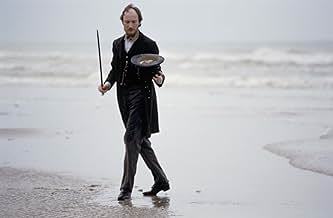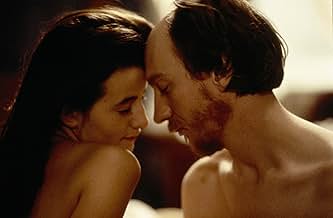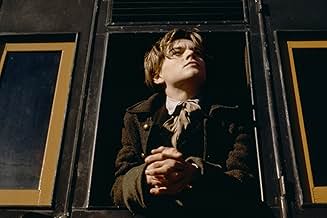IMDb-BEWERTUNG
6,4/10
17.371
IHRE BEWERTUNG
Der junge, wilde Dichter Arthur Rimbaud und sein Mentor Paul Verlaine begeben sich in eine heftige, verbotene Romanze, während sie die Auswirkungen eines höllischen künstlerischen Lebensstil... Alles lesenDer junge, wilde Dichter Arthur Rimbaud und sein Mentor Paul Verlaine begeben sich in eine heftige, verbotene Romanze, während sie die Auswirkungen eines höllischen künstlerischen Lebensstils spüren.Der junge, wilde Dichter Arthur Rimbaud und sein Mentor Paul Verlaine begeben sich in eine heftige, verbotene Romanze, während sie die Auswirkungen eines höllischen künstlerischen Lebensstils spüren.
- Regie
- Drehbuch
- Hauptbesetzung
- Auszeichnungen
- 1 Gewinn & 1 Nominierung insgesamt
Félicie Pasotti
- Isabelle, as a child
- (as Felicie Pasotti Cabarbaye)
James Thierrée
- Frederic
- (as James Thiérrée)
Aza Declercq
- Prostitute
- (Nicht genannt)
Empfohlene Bewertungen
This art-house film is not a crowd-pleaser but is nevertheless an excellent film. It is one of DiCaprio's best independent films before he became a titanic superstar.
Rimbaud"s painfully self-destructive bisexual life and his affair with Verlaine is not a "nice" story to tell, but the drama is interesting as a study in the eccentric mind of the artist. Beneath the plot is the age-old question of whether the artist's oddness hinders his creativity or is actually the fuel for his art.
Rimbaud"s painfully self-destructive bisexual life and his affair with Verlaine is not a "nice" story to tell, but the drama is interesting as a study in the eccentric mind of the artist. Beneath the plot is the age-old question of whether the artist's oddness hinders his creativity or is actually the fuel for his art.
This is a worthy and successful attempt to make a film about the famous literary and personal relationship between two great poets, Paul Verlaine and the young Arthur Rimbaud. How the French must have resented its being made in English! (But why did the French themselves never film this story, which is so fundamental to the mythology of their literature?) There is no use viewers and reviewers complaining that the characters are disgusting: everybody knows they were, and they would have been the first to admit it. This film has not been made for the wrong reasons, with fictional characters, but is a true story. It is rather disturbing to realize that absinthe has been legalised again and people are drinking it once more, when we see how it drove these two poets insane, which is what is really does, you know! The banning of absinthe should never have been lifted. It may be a pretty green colour, but it is not romantic or at all glamorous. One strange omission from this film is any of the poetry of either poet! Very few decent translations of Verlaine into English exist, because he used rhyme so much. But he was a great and soaring poet, and of course Rimbaud shattered all the moulds and basically founded modern poetry, and had the status of a god to the Surrealists. So it would have been good to hear some of their work, especially as it is all out of copyright and no one could have objected. The lack of the poetry stops people who do not already know it from appreciating the point of all this carrying-on. Verlaine and Rimbaud were appalling, violent, disorderly, and to call them extreme Bohemians doesn't go far enough: they were both quite mad as well. But then, many poets are, and often the finest poetry comes from the ones who are the craziest (David Gascoyne, whom I knew well, is an example, and Ezra Pound whom I knew less well was not what you could call well-balanced). It is often said that there is a fine line between genius and madness, but with poets, the situation is even more dire: to be a divinely inspired poet it seems that it is almost a requirement that you first lose your mind. (Exceptions are those with no fire in their temperament at all: Eliot, Perse, Valery, or those who have become spiritual beings while still on earth, such as Rilke.) Well, the performances and direction are excellent here. Agnieszka Holland is an inspired director, a protégé of Wajda, and perhaps her greatest achievement was 'Washington Square' (1997). She is interested in art, not commerce, and congratulations to her for that! The young Leonardo Di Caprio, aged 20, was a scintillating, wild, and wholly convincing Rimbaud. You could believe every scene. David Thewlis was equally convincing as Verlaine, despite being rather too thin for the part (Verlaine was stockier and plumper, and Thewlis looks like he hasn't had a decent meal for ten years). Romane Bohringer was an excellent choice for Verlaine's wife, and plays it just right. The next year she would make her staggering pair of films, 'L'Appartement' and 'Portraits Chinois', in both of which she sets the cinema on fire. So the talent is there, and the film is delivered. If we find these people disturbing, it is because they were. But without this bizarre tale, twentieth century poetry would not have come into existence, because it was created by Arthur Rimbaud, and without Verlaine taking him under his wing it would never have happened. Christopher Hampton's screenplay is intelligent and thoughtful and well-crafted throughout. But then, that is what he does. It is good to have this on the screen, but for those who do not already know the story, it must be a real shocker. It is also not a film for 'homophobes', and if you don't want to see Leonard Di Caprio kissing a man on the mouth, look away now.
It's a good thing not too many people saw this film when it came out [no pun intended], because, if any of DiCaprio's female fans had seen him in this, one of his best early roles, his career would have been over well before he was involved in "Titanic." And that's because he's so utterly convincing as the tortured, bisexual teen genius poet Arthur Rimbaud, that it would undoubtedly set many of those young ladies to wondering if he'd played the part a little TOO well, if you get my meaning. If ever there was any such thing as a male femme fatale, It's Leo right here. Rumor has it that he tried to have the video pulled a few years ago, right after his "Titanic" success. It's a good thing he wasn't successful, because I think that this film rates right along with "The Basketball Diaries" as possibly his best performance.
But it takes two to tango, at least in this case, and David Thewlis is almost as good opposite DiCaprio as Paul Verlaine, who began as Rimbaud's mentor and wound up as his long-time lover. As Verlaine was ugly and overweight, whereas Rimbaud was lithe and handsome, the two seemingly would have made an unbelieveably odd couple physically, but were drawn together more by their mutual likes and dislikes rather than physical attraction. And that's what you sense through all of their scenes together, a meeting of minds more than a meeting of bodies.
There were many who praised this movie, there were many who hated it, but love it or hate it, it holds a strange fascination which makes you remember it long after you've seen it.
But it takes two to tango, at least in this case, and David Thewlis is almost as good opposite DiCaprio as Paul Verlaine, who began as Rimbaud's mentor and wound up as his long-time lover. As Verlaine was ugly and overweight, whereas Rimbaud was lithe and handsome, the two seemingly would have made an unbelieveably odd couple physically, but were drawn together more by their mutual likes and dislikes rather than physical attraction. And that's what you sense through all of their scenes together, a meeting of minds more than a meeting of bodies.
There were many who praised this movie, there were many who hated it, but love it or hate it, it holds a strange fascination which makes you remember it long after you've seen it.
I realized going into this film that it was not going to be a straight bio-pic about Rimbaud's life so that loosened my expectations for the movie a bit, which is good considering had I expected a life story I would've been sorely disappointed. This film is more about Rimbaud's rocky relationship with fellow poet, Verlaine, whom he falls in love with and subsequently about Verlaine being stuck between a rock and a hard place with Rimbaud on one side and his beautiful but ultimately empty headed wife, Mathilde on the other.
The set/costume design was done well enough; not enough to win awards but enough to make the time and place believable. What stands out the most, though, is the acting and of course the wonderful violin heavy score. DiCaprio gives an inspired performance as the young, opinionated, Rimbaud as does Thewlis in his role as the older poet, Verlaine who takes him under his wing. You won't get a complete round view of either man or his life here, but what you will get is a story about love, madness, writing and the search for meaning.
If you like what you see of Rimbaud from this movie, I would whole heartedly recommend his work to you and any and all written biographies as they will shed even more light on a truly great poet's life.
The set/costume design was done well enough; not enough to win awards but enough to make the time and place believable. What stands out the most, though, is the acting and of course the wonderful violin heavy score. DiCaprio gives an inspired performance as the young, opinionated, Rimbaud as does Thewlis in his role as the older poet, Verlaine who takes him under his wing. You won't get a complete round view of either man or his life here, but what you will get is a story about love, madness, writing and the search for meaning.
If you like what you see of Rimbaud from this movie, I would whole heartedly recommend his work to you and any and all written biographies as they will shed even more light on a truly great poet's life.
Of course there is pain and monstrosity in love. Two wild poets would need to live that out. But can a movie about it make any sense, without a fair portion of their poetry?
Michelangelo said that painting excels when it approaches sculpture, and sculpture when it comes close to relief. An art form is enhanced when nearing its periphery, almost turning into another art form. Along this line, I am sure that the poetry of Rimbaud and Verlaine would have stood forward excellently, when recited in the movie about their relation. It would also have helped in making their interactions understandable.
After seeing the movie a second time, I read some of Rimbaud's writings, and there was a slightly different character emerging from his words, than the one portrayed, though excellently, by Leonardo DiCaprio. Rimbaud's own words show that he was a victim just as much as a predator. Of course, he would say so, himself, but also: this modification would have made the movie rise beyond the black and white polarity it is too often caught in.
Still, I enjoyed the movie tremendously, mostly thanks to Leo and the way he made his character fire up. He might have been type-cast, to do the obnoxious adolescent, but they got more than they bargained for - he included the most important aspect of Rimbaud: the prodigy poet, the artist living for art, loving for art.
His acting is sometimes stunning, and not only in delicate scenes where minute nuances are essential, but also in all kinds of silliness in between. To hear him bark like a dog, really like a dog - did he do that himself, or was there an added sound effect? The pause, and the slightly humorous expression on his face, right before he tells his fellow poet that he expects more from him than his words. His posture and cocky moving about in the Paris of the noble poets, and his running on all four in the countryside. Brilliant acting.
There's a lot of formidable acting also on behalf of the others in the cast, even when the script and the direction works against them. And it does, more than once. Maybe the plot got all confused, simply because the poetry of the poets was not taken into account.
But a film gone awry can still be a wonderful experience. Frustrating, but wonderful. This one is.
Michelangelo said that painting excels when it approaches sculpture, and sculpture when it comes close to relief. An art form is enhanced when nearing its periphery, almost turning into another art form. Along this line, I am sure that the poetry of Rimbaud and Verlaine would have stood forward excellently, when recited in the movie about their relation. It would also have helped in making their interactions understandable.
After seeing the movie a second time, I read some of Rimbaud's writings, and there was a slightly different character emerging from his words, than the one portrayed, though excellently, by Leonardo DiCaprio. Rimbaud's own words show that he was a victim just as much as a predator. Of course, he would say so, himself, but also: this modification would have made the movie rise beyond the black and white polarity it is too often caught in.
Still, I enjoyed the movie tremendously, mostly thanks to Leo and the way he made his character fire up. He might have been type-cast, to do the obnoxious adolescent, but they got more than they bargained for - he included the most important aspect of Rimbaud: the prodigy poet, the artist living for art, loving for art.
His acting is sometimes stunning, and not only in delicate scenes where minute nuances are essential, but also in all kinds of silliness in between. To hear him bark like a dog, really like a dog - did he do that himself, or was there an added sound effect? The pause, and the slightly humorous expression on his face, right before he tells his fellow poet that he expects more from him than his words. His posture and cocky moving about in the Paris of the noble poets, and his running on all four in the countryside. Brilliant acting.
There's a lot of formidable acting also on behalf of the others in the cast, even when the script and the direction works against them. And it does, more than once. Maybe the plot got all confused, simply because the poetry of the poets was not taken into account.
But a film gone awry can still be a wonderful experience. Frustrating, but wonderful. This one is.
Wusstest du schon
- WissenswertesOuzo was used as a replacement for absinthe for the drinking scenes filmed on the first day. Because the scene turned out so well, method drinking was adopted for the rest of filming. As a result, Thewlis had admitted in a interview that he can't really remember making the film at all.
- PatzerIn the Café Andre where the adult Isabelle Rimbaud meets with Paul Verlaine, the typeface on the window is clearly in Helvetica, a typeface that was not created until 1954.
- Zitate
[last lines]
Arthur Rimbaud: I've found it. What? Eternity. It's the sun mingled with the sea.
- SoundtracksArrival
Composed by Hank Deckon and Jan A.P. Kaczmarek
Performed by Warsaw Symphony Orchestra and Wilanow String Quartet
Conductor [Warsaw Symphony] Krzesimir Debski
Top-Auswahl
Melde dich zum Bewerten an und greife auf die Watchlist für personalisierte Empfehlungen zu.
- How long is Total Eclipse?Powered by Alexa
Details
- Erscheinungsdatum
- Herkunftsländer
- Sprache
- Auch bekannt als
- Total Eclipse
- Drehorte
- Produktionsfirmen
- Weitere beteiligte Unternehmen bei IMDbPro anzeigen
Box Office
- Budget
- 8.000.000 $ (geschätzt)
- Bruttoertrag in den USA und Kanada
- 340.139 $
- Eröffnungswochenende in den USA und in Kanada
- 131.269 $
- 5. Nov. 1995
- Weltweiter Bruttoertrag
- 340.139 $
Zu dieser Seite beitragen
Bearbeitung vorschlagen oder fehlenden Inhalt hinzufügen

Oberste Lücke
By what name was Die Affäre von Rimbaud und Verlaine (1995) officially released in India in English?
Antwort






























